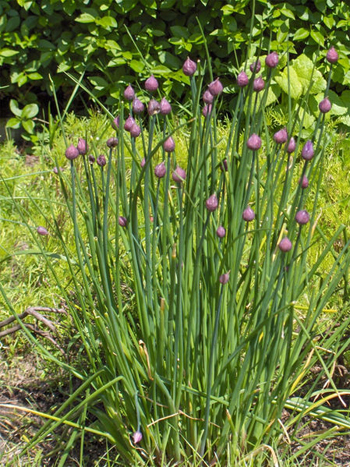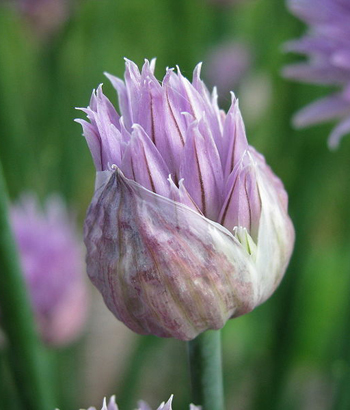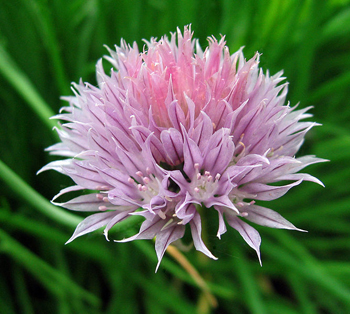Contents:
Common Names | Parts Usually Used | Plant(s) & Culture | Where Found | Medicinal Properties | Biochemical Information
Legends, Myths and Stories | Uses | Formulas or Dosages | Nutrient Content | How Sold | Bibliography
Scientific Names

- Allium schoenoprasum L.
- Liliaceae
- Lily family
Common Names
- Cives
- Civet
- Rush Leeks
- Sweth
Parts Usually Used
The aerial parts, above the ground
Back to Top

Description of Plant(s) and Culture
Chives are hardy perennials; grow in clumps of small white bulbous roots that send off numerous fine, grass-like, hollow green spears. The root bulbs develop in clusters; they send up a thin stalk on which appear in early summer a lavender blossom that is actually a cluster of tiny blooms. Seeds follow the flowers. Some gardeners say chives repel Japanese beetles and black spot on roses, scab on apples, and mildew on cucubits; this has not been proven.
Back to Top
Where Found
Found all over Europe, East Asia, the Orient, and from the Caucasus right up to Siberia.
Back to Top
Medicinal Properties
Stimulant, diuretic, tonic
Back to Top
Biochemical Information
Mustard oil
Back to Top

Legends, Myths and Stories
Chives are an ancient herb brought to the West from China by Marco Polo. One of the French fines herbes, chives possess a delicate onion flavor and are an important addition to a kitchen garden. In centuries past people hung chives in their homes, from ceilings and bedposts, to ward off evil and disease.
First discovered in China 5000 years ago, chives later became popular in Europe not only for their subtle onion flavor but because of the widespread belief that their grasslike leaves chase away evil spirits and disease.
Chives contain a large amount of mustard oil which gives them their sharp taste.
Garlic chives are chives with a mild garlic flavor. They are called Chinese chives (A. tuberosum) or they can use the same name as ordinary chives. Also known as Oriental garlic, Chinese leeks, and gow choy. They are taller than regular chives, with numerous star shaped white flowers that appear in late summer and early fall. Garlic chives are used in Oriental dishes to give them their characteristic flavor.
Back to Top
Uses
Chives stimulate the appetite and aid in digestion. Useful in anemia and as a blood cleanser. Clears phlegm in catarrh.
Back to Top
Formulas or Dosages
Chives must be eaten fresh to receive maximum benefit.
Back to Top
Nutrient Content
High in vitamin C and iron
Back to Top
How Sold
At the supermarket, dried in the spice section
Back to Top
Bibliography
![]() Country Home Book of Herbs
Country Home Book of Herbs, Meredith Books, Editorial Dept. RW240, 1716 Locust Street, Des Moines, IA 50309-3023, copyright 1994
 Earl Mindell’s Herb Bible
Earl Mindell’s Herb Bible, by Earl Mindell, R.Ph., Ph.D., Simon & Schuster/Fireside, Rockefeller Center 1230 Avenue of the Americas, New York, New York 10020
![]() The Complete Medicinal Herbal
The Complete Medicinal Herbal, by Penelope Ody, Dorling Kindersley, Inc, 232 Madison Avenue, New York, NY 10016, First American Edition, copyright 1993
![]() The Herbalist Almanac
The Herbalist Almanac, by Clarence Meyer, Meyerbooks, publisher, PO Box 427, Glenwood, Illinois 60425, copyright 1988, fifth printing, 1994
Herbal Gardening, compiled by The Robison York State Herb Garden, Cornell Plantations, Matthaei Botanical Gardens of the University of Michigan, University of California Botanical Garden, Berkeley., Pantheon Books, Knopf Publishing Group, New York, 1994, first edition
![]() The Nature Doctor: A Manual of Traditional and Complementary Medicine
The Nature Doctor: A Manual of Traditional and Complementary Medicine, by Dr. H.C.A. Vogel; Keats Publishing, Inc., 27 Pine Street (Box 876) New Canaan, CT. 06840-0876. Copyright Verlag A. Vogel, Teufen (AR) Switzerland 1952, 1991
![]() Webster’s New World Dictionary
Webster’s New World Dictionary, Third College Edition, Victoria Neufeldt, Editor in Chief, New World Dictionaries: A Division of Simon & Schuster, Inc., 15 Columbus Circle, New York, NY 10023
 The Rodale Herb Book: How to Use, Grow, and Buy Nature’s Miracle Plants (An Organic gardening and farming book)
The Rodale Herb Book: How to Use, Grow, and Buy Nature’s Miracle Plants (An Organic gardening and farming book), edited by William H. Hylton, Rodale Press, Inc. Emmaus, PA, 18049., 1974
